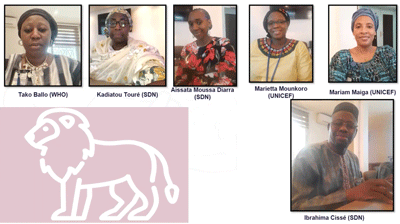A second cohort of nutrition leaders in West and Central Africa has completed the blended learning program aimed at building their capacity to implement programs to improve rates of exclusive breastfeeding using social and behavior change. The course was developed by Alive & Thrive in collaboration with UNICEF and WHO, and is part of the Stronger With Breastmilk Only regional initiative.
The second cohort included 23 participants from Côte d’Ivoire, Republic of the Congo, Equatorial Guinea and Mali. The first cohort of nutrition leaders completed the course in March.
“All of the modules were excellent,” said Dr. Ibrahima Cissé, a Nutritionist MPH with the Nutrition Directorate in the Ministry of Health of Mali, who participated in the program as part of a six-person team from Mali. “But what stood out to me was the programmatic approach, which aims to provoke social and behavior change. This was the most interesting.”
Dr. Cissé’s fellow participants indicated similar levels of satisfaction in a comprehensive evaluation of the program including surveys completed at the close of each of the course’s 12 weekly modules.
The blended learning program combines elements of online learning with live videoconferences and coaching from technical experts. The material focuses on giving participants access to up-to-date knowledge and successful experiences to protect, promote and support exclusive breastfeeding, a theoretical and practical understanding of social and behavior change approaches and planning, and specifically seeks to help them develop budgeted plans to increase rates of exclusive breastfeeding.
Across West and Central Africa, giving water to babies is a common practice. Learn more about the factors that influence feeding practices in this literature review published by Alive & Thrive and UNICEF.
 Dr. Cissé served as the focal point for the team in Mali, which included five others – two colleagues from the Nutrition Directorate, two from UNICEF Mali and one from the World Health Organization’s Mali program. They called their team the Lions of Mali.
Dr. Cissé served as the focal point for the team in Mali, which included five others – two colleagues from the Nutrition Directorate, two from UNICEF Mali and one from the World Health Organization’s Mali program. They called their team the Lions of Mali.
“It was a great experience for us,” he said. “We thought it was a heavy load at the beginning, with all of our other work, but over time the team became familiar and we adapted. The coaching motivated us.”
Ultimately, the team will soon achieve the program’s primary goal – to develop a budgeted action plan for improving rates of exclusive breastfeeding. The plan is being finalized now and will be validated in November, he said.
“We are gaining ground every day in Mali,” Dr. Cissé said, pointing to progress on exclusive breastfeeding rates in the country. Roughly 41% of infants 0 to 5 months are exclusively breastfeed, according to the latest available data (UNICEF, 2019), slightly higher than the regional average of 37% but below the World Health Assembly’s 2025 global target of 50%.

The blended learning program grew out of requests from across the region to build capacity to in social and behavioral change to improve the design and effectiveness of nutrition programs, explained Nathalie Likhite, Alive & Thrive’s senior SBC advisor for West Africa. After an intensive design effort, the first cohort was launched in September 2021: 56 nutrition leaders from six countries – Benin, Cameroon, Chad, Democratic Republic of Congo, Guinea, and Togo.
After reviewing the first cohort’s experience, Alive & Thrive revised the program to improve it, Likhite said.
“We refined the program based on feedback,” she said. “Improvements focus on making sure the program's structure was re-organized to enhance focus on the final performance objective – to develop a budgeted plan for exclusive breastfeeding based on social and behavioral change principles.”
“One strength of this program is linking the country teams with social and behavioral change experts to help consolidate learning, clarify some of the topics discussed in the program and to assist them in developing action plans,” said Dedenyo Adossi, an Alive & Thrive consultant who helped coach the country teams. “The coaching also ensures the teams stay on track to complete the various assignments, which is a challenge because we know they are busy with their daily work.”
Alive & Thrive is now exploring options to produce a self-paced version of the program.
